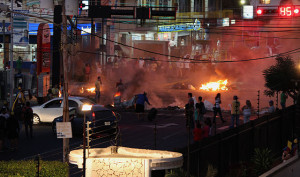American Media Distorts Venezuelan Protests
MEDIA, 7 Apr 2014
Nathalie Baptiste – Foreign Policy In Focus
Anti-government protests are being conducted by wealthier, right-wing Venezuelans, who have caused more deaths than security officials.
For the last several weeks, much of the American media has been reporting on the anti-government protests occurring in the streets of Venezuela. Many major outlets have depicted Venezuela as being in the midst of a Ukrainian-style revolution. Stories of violent government crackdowns and photos of Venezuelans taking to the streets in droves to topple their democratically elected president Nicolás Maduro have saturated the media, but do those photos and stories represent the full story? Or has the American media been distorting the situation in Venezuela?
On February 20, the New York Times reported that the only media outlet that regularly broadcasted the voices of the opposition was sold last year and since then their news coverage has been softened. The Committee to Protect Journalists took it a step further by writing that nearly all the Venezuelan media has been ignoring the protests because it is all controlled by or allied with the Maduro government.
Whether or not the media has equal representations of both sides is critical. In an effort to paint President Nicolas Maduro as a dictator, opposition leader Leopold Lopez alleged that there was no longer any free media for government critics to express themselves. The American media quickly picked this up as fact without doing any research.
A quick look at the facts quickly leads to the realization that Leopold’s statements are patently false. The biggest broadcasting station Venevisión—which has 35 percent of the news-watching audience during key newsworthy events—actually does broadcast opposition voices including Tomàs Gaunipa, the leader of the Primero Justica (First Justice) opposition party, and María Corina Machado, a prominent hardline opposition leader.
The poor coverage of the Venezuelan protests extends beyond reporting false statements regarding the Venezuelan media. In its portrayal of the protests the American media is reporting that the protests are nationwide. The Latin Post reports that the protests are disrupting life in Venezuela; however, an on-the-ground report from The Guardian reveals that for much of Caracas, life is operating as normal, save for the few wealthy enclaves of the city. It appears that the anti-government protests are being conducted by wealthier, right-wing Venezuelans.
The Caracas Chronicles wrote on February 20 of a violent crackdown against protesters in Venezuela. The piece even went viral, garnering international attention from all sides of the political spectrum. The article painted a dark picture of state-sanctioned murders. In reality, more victims have been killed at the hands of protesters, than at the hands security officials.
The above observations are not meant to discredit any grievances of the Venezuelans or to gloss over the deaths and injuries that have occurred. Nor are they an attempt to explain the reasoning behind the protests. However, the misinformation being spread by the media is distorting the real story in Venezuela. Before the United States or the average citizen can endorse or condemn the protests currently happening in Venezuela, a balanced and truthful picture of the situation must be painted.
_______________________
Nathalie Baptiste is a Haitian-American contributor to Foreign Policy In Focus who lives in the Washington, D.C. area. She holds a BA and MA in International Studies and writes about Latin America and the Caribbean.
DISCLAIMER: The statements, views and opinions expressed in pieces republished here are solely those of the authors and do not necessarily represent those of TMS. In accordance with title 17 U.S.C. section 107, this material is distributed without profit to those who have expressed a prior interest in receiving the included information for research and educational purposes. TMS has no affiliation whatsoever with the originator of this article nor is TMS endorsed or sponsored by the originator. “GO TO ORIGINAL” links are provided as a convenience to our readers and allow for verification of authenticity. However, as originating pages are often updated by their originating host sites, the versions posted may not match the versions our readers view when clicking the “GO TO ORIGINAL” links. This site contains copyrighted material the use of which has not always been specifically authorized by the copyright owner. We are making such material available in our efforts to advance understanding of environmental, political, human rights, economic, democracy, scientific, and social justice issues, etc. We believe this constitutes a ‘fair use’ of any such copyrighted material as provided for in section 107 of the US Copyright Law. In accordance with Title 17 U.S.C. Section 107, the material on this site is distributed without profit to those who have expressed a prior interest in receiving the included information for research and educational purposes. For more information go to: http://www.law.cornell.edu/uscode/17/107.shtml. If you wish to use copyrighted material from this site for purposes of your own that go beyond ‘fair use’, you must obtain permission from the copyright owner.
